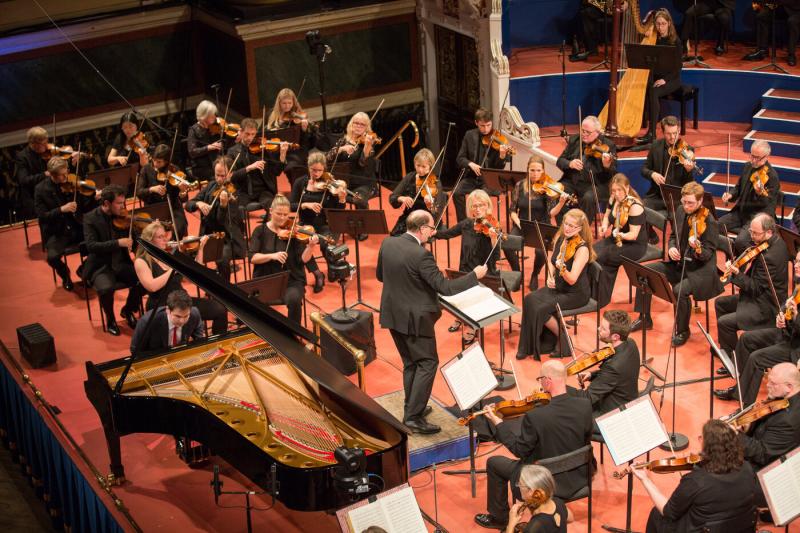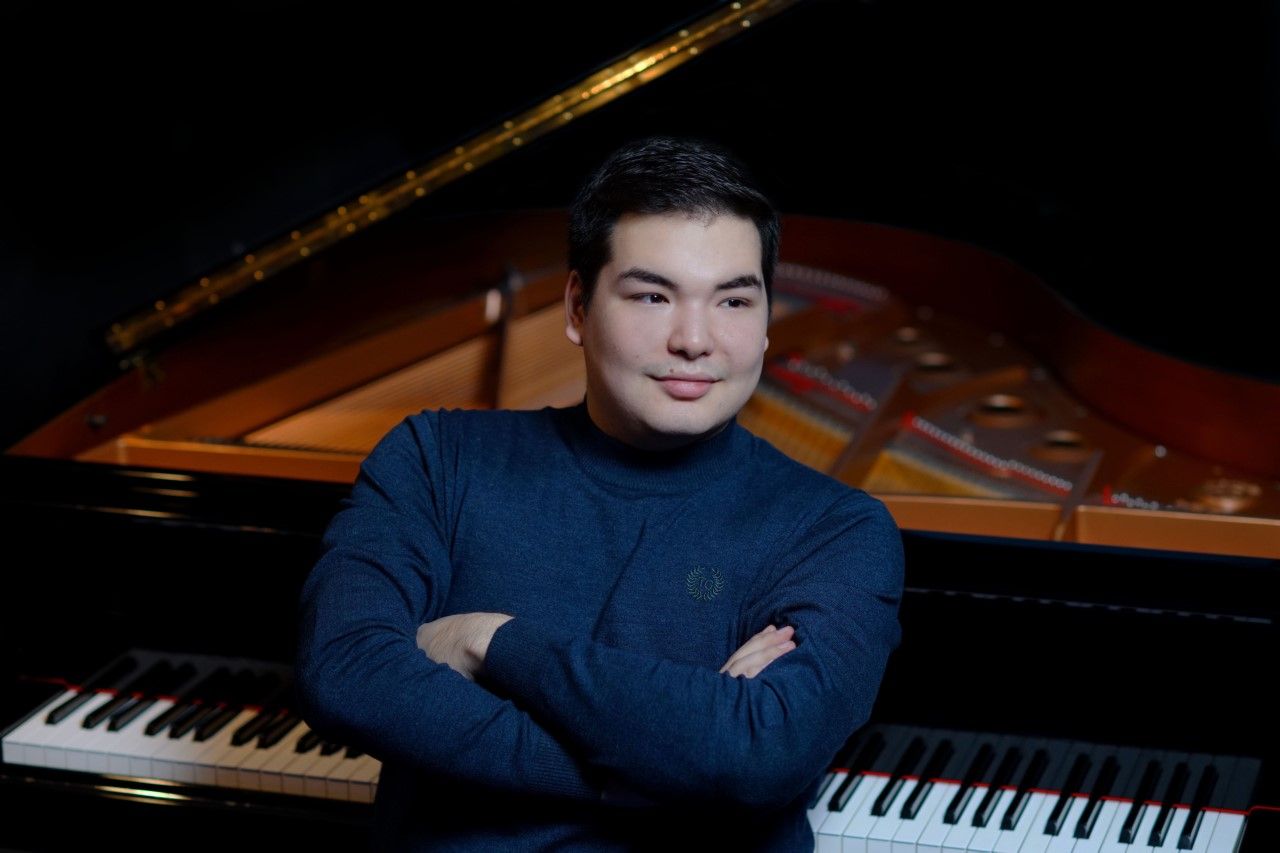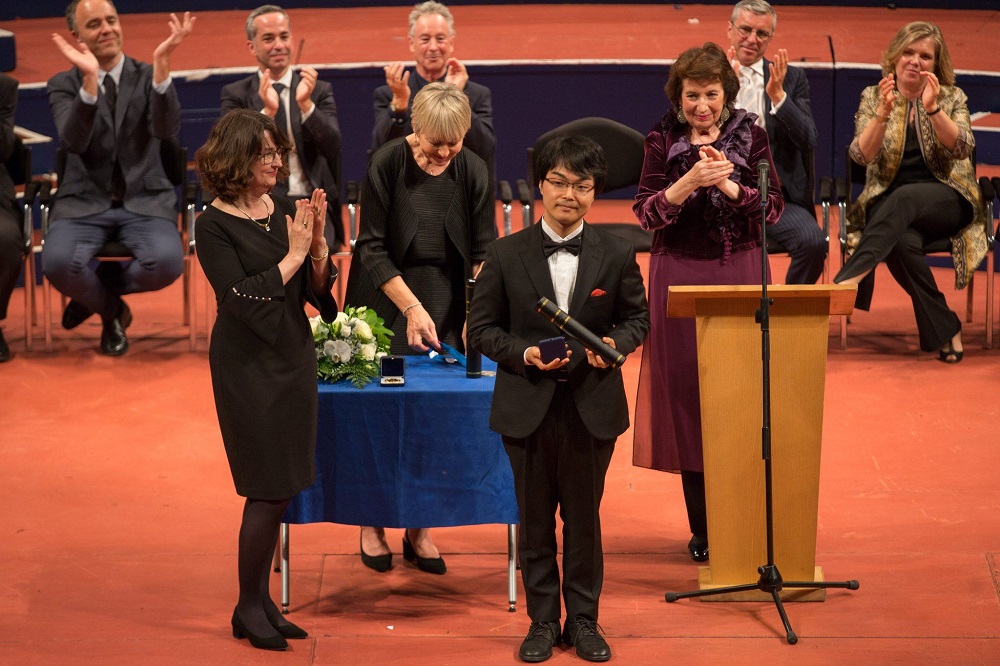Leeds International Piano Competition Finals, Leeds Town Hall review - a hi-tech, low carbon musical celebration | reviews, news & interviews
Leeds International Piano Competition Finals, Leeds Town Hall review - a hi-tech, low carbon musical celebration
Leeds International Piano Competition Finals, Leeds Town Hall review - a hi-tech, low carbon musical celebration
Upbeat close to one of the UK's great musical events

It’s easy to forget that what you see in a competition final isn’t always the full story, the jury members’ votes in this case based on what had gone on in the earlier rounds.
Five concertos spread over two nights was an embarrassment of riches, and attending just the finals as a listener means that you can’t help ranking, rather guiltily, each pianist’s performance based on how much you know and/or like the work they’re playing. That’s why we have professional juries comprised of experts, folks. Finalists play in alphabetical order, so you feel for the opening act on the Friday night. He was the Ukrainian Dmytro Choni, a 28 year old international competition veteran whose account of Beethoven’s Third Piano Concerto was elegant and poised, the concerto’s gruffer edges smoothed over. Choni’s lyrical delivery of the first movement’s second theme was distinctive, and the finale’s shift to C major was well-judged.
But there wasn’t much sense of communion between Choni and Andrew Manze’s lithe and responsive Royal Liverpool Philharmonic – something which was much more evident in the young British pianist Thomas Kelly’s account of the same composer's Fourth Concerto, the first evening’s final work. Kelly’s poised, cool opening was striking, giving no hint of how energised and involving the performance soon became.  Manze’s string recitatives in the slow movement were stark and jagged, Kelly’s calm response appealing. Surely he’d be a winner? As it happened, no; Kelly came fifth, with Choni fourth, but his warm, affable style of music-making makes him someone I’m keen to hear again soon. The first prize went to Alim Beisembayev (pictured above) from Kazakhstan, whose electrifying, exhilarating take on Rachmaninov’s Rhapsody on a Theme of Paganini was one of the most exciting things I’ve witnessed live. Beisembayev stressed the piece’s brittle modernity, his sharp, incisive playing nicely matched by the RLPO’s winds and brass. The boldness, the bigness of his sound filled the hall, Beisembayev’s account of the 18th variation both commanding and warmly lyrical. He’s the real thing; that he also won the Audience Award and that for Best Contemporary Performance reinforces the rightness of the jury’s decision.
Manze’s string recitatives in the slow movement were stark and jagged, Kelly’s calm response appealing. Surely he’d be a winner? As it happened, no; Kelly came fifth, with Choni fourth, but his warm, affable style of music-making makes him someone I’m keen to hear again soon. The first prize went to Alim Beisembayev (pictured above) from Kazakhstan, whose electrifying, exhilarating take on Rachmaninov’s Rhapsody on a Theme of Paganini was one of the most exciting things I’ve witnessed live. Beisembayev stressed the piece’s brittle modernity, his sharp, incisive playing nicely matched by the RLPO’s winds and brass. The boldness, the bigness of his sound filled the hall, Beisembayev’s account of the 18th variation both commanding and warmly lyrical. He’s the real thing; that he also won the Audience Award and that for Best Contemporary Performance reinforces the rightness of the jury’s decision.
Still, my favourite performance came at the start of the second evening, when silver medallist Kaito Kobayashi (pictured below receiving his award) gave us Bartok’s valedictory Third Concerto. That Kobayashi hadn’t performed the work with an orchestra before might have given his reading extra edge and bite in the more extrovert passages. The second movement’s soft chords were heart-stopping, the ensuing bird and insect calls uniquely vivid. Bartók's finale danced, Kobayashi’s dexterity matched by some splendid timpani and percussion work. Brahms’s Second Concerto shouldn’t have sounded anticlimactic after the Bartók, and you really felt for third-placed Ariel Lanyi in having to give the competition’s closing performance. He and Manze started well, helped by Tim Jackson’s warm-toned horn solo, but this long, long concerto dragged. There was much to admire: Lanyi’s emotional generosity in the first movement’s lyrical passages was striking, and there was a glorious contribution from principal cello Jonathan Aasgaard in the Andante. Maybe he, and we in the audience, were a tad weary by then, I’d certainly pay to hear Lanyi play the concerto again in a different setting.
Brahms’s Second Concerto shouldn’t have sounded anticlimactic after the Bartók, and you really felt for third-placed Ariel Lanyi in having to give the competition’s closing performance. He and Manze started well, helped by Tim Jackson’s warm-toned horn solo, but this long, long concerto dragged. There was much to admire: Lanyi’s emotional generosity in the first movement’s lyrical passages was striking, and there was a glorious contribution from principal cello Jonathan Aasgaard in the Andante. Maybe he, and we in the audience, were a tad weary by then, I’d certainly pay to hear Lanyi play the concerto again in a different setting.
It feels churlish to grumble; both evenings contained stunning playing. I do wish that the finalists were able to select from a broader pool of concertos; wouldn’t it be fun to hear someone tackle Saint-Saëns, or Poulenc, or Gershwin? And, while Manze and the RLPO achieved miracles on extremely limited rehearsal time, what if Leeds’s own Orchestra of Opera North could take on accompanying duties? Still, that this huge event took place at all is worth celebrating, artistic director Adam Gatehouse paying warm tribute to the scores of organisations and individuals behind the scenes who made things happen. Only a few years to wait until the next one: let’s see what happens in 2024.
rating
Share this article
The future of Arts Journalism
You can stop theartsdesk.com closing!
We urgently need financing to survive. Our fundraising drive has thus far raised £49,000 but we need to reach £100,000 or we will be forced to close. Please contribute here: https://gofund.me/c3f6033d
And if you can forward this information to anyone who might assist, we’d be grateful.

Subscribe to theartsdesk.com
Thank you for continuing to read our work on theartsdesk.com. For unlimited access to every article in its entirety, including our archive of more than 15,000 pieces, we're asking for £5 per month or £40 per year. We feel it's a very good deal, and hope you do too.
To take a subscription now simply click here.
And if you're looking for that extra gift for a friend or family member, why not treat them to a theartsdesk.com gift subscription?
more Classical music
 BBC Proms: Steinbacher, RPO, Petrenko / Sternath, BBCSO, Oramo review - double-bill mixed bag
Young pianist shines in Grieg but Bliss’s portentous cantata disappoints
BBC Proms: Steinbacher, RPO, Petrenko / Sternath, BBCSO, Oramo review - double-bill mixed bag
Young pianist shines in Grieg but Bliss’s portentous cantata disappoints
 theartsdesk at the Lahti Sibelius Festival - early epics by the Finnish master in context
Finnish heroes meet their Austro-German counterparts in breathtaking interpretations
theartsdesk at the Lahti Sibelius Festival - early epics by the Finnish master in context
Finnish heroes meet their Austro-German counterparts in breathtaking interpretations
 Classical CDs: Sleigh rides, pancakes and cigars
Two big boxes, plus new music for brass and a pair of clarinet concertos
Classical CDs: Sleigh rides, pancakes and cigars
Two big boxes, plus new music for brass and a pair of clarinet concertos
 Waley-Cohen, Manchester Camerata, Pether, Whitworth Art Gallery, Manchester review - premiere of no ordinary violin concerto
Images of maternal care inspired by Hepworth and played in a gallery setting
Waley-Cohen, Manchester Camerata, Pether, Whitworth Art Gallery, Manchester review - premiere of no ordinary violin concerto
Images of maternal care inspired by Hepworth and played in a gallery setting
 BBC Proms: Barruk, Norwegian Chamber Orchestra, Kuusisto review - vague incantations, precise laments
First-half mix of Sámi songs and string things falters, but Shostakovich scours the soul
BBC Proms: Barruk, Norwegian Chamber Orchestra, Kuusisto review - vague incantations, precise laments
First-half mix of Sámi songs and string things falters, but Shostakovich scours the soul
 BBC Proms: Alexander’s Feast, Irish Baroque Orchestra, Whelan review - rapturous Handel fills the space
Pure joy, with a touch of introspection, from a great ensemble and three superb soloists
BBC Proms: Alexander’s Feast, Irish Baroque Orchestra, Whelan review - rapturous Handel fills the space
Pure joy, with a touch of introspection, from a great ensemble and three superb soloists
 BBC Proms: Moore, LSO, Bancroft review - the freshness of morning wind and brass
English concert band music...and an outlier
BBC Proms: Moore, LSO, Bancroft review - the freshness of morning wind and brass
English concert band music...and an outlier
 Willis-Sørensen, Ukrainian Freedom Orchestra, Wilson, Cadogan Hall review - romantic resilience
Passion, and polish, from Kyiv's musical warriors
Willis-Sørensen, Ukrainian Freedom Orchestra, Wilson, Cadogan Hall review - romantic resilience
Passion, and polish, from Kyiv's musical warriors
 BBC Proms: Faust, Gewandhausorchester Leipzig, Nelsons review - grace, then grandeur
A great fiddler lightens a dense orchestral palette
BBC Proms: Faust, Gewandhausorchester Leipzig, Nelsons review - grace, then grandeur
A great fiddler lightens a dense orchestral palette
 BBC Proms: Jansen, Royal Concertgebouw Orchestra, Mäkelä review - confirming a phenomenon
Second Prom of a great orchestra and chief conductor in waiting never puts a foot wrong
BBC Proms: Jansen, Royal Concertgebouw Orchestra, Mäkelä review - confirming a phenomenon
Second Prom of a great orchestra and chief conductor in waiting never puts a foot wrong
 BBC Proms: Royal Concertgebouw Orchestra, Mäkelä review - defiantly introverted Mahler 5 gives food for thought
Chief Conductor in Waiting has supple, nuanced chemistry with a great orchestra
BBC Proms: Royal Concertgebouw Orchestra, Mäkelä review - defiantly introverted Mahler 5 gives food for thought
Chief Conductor in Waiting has supple, nuanced chemistry with a great orchestra
 Dunedin Consort, Butt / D’Angelo, Muñoz, Edinburgh International Festival 2025 review - tedious Handel, directionless song recital
Ho-hum 'comic' cantata, and a song recital needing more than a beautiful voice
Dunedin Consort, Butt / D’Angelo, Muñoz, Edinburgh International Festival 2025 review - tedious Handel, directionless song recital
Ho-hum 'comic' cantata, and a song recital needing more than a beautiful voice

Add comment